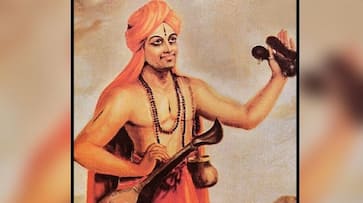Today (February 11) is the Punyatithi of Purandara Dasa.
Bengaluru: A saint, a musician, a singer, a social reformer, a poet, and most importantly, a great devotee. That was Purandara Dasa, who played a key role in the Bhakti movement.
Born in Shivamogga, Karnataka as Srinivasa Nayaka in 1484, he grew up to be a wealthy merchant. He was known for his miserliness and avarice.
But diametrically oppositely, one day, he understood the ephemerality and transitoriness of the world and renounced the world, to become a Haridasa or a servant of the Lord.
Purandara Dasa followed Dvaita philosophy and was a disciple of Vyasa Thirtha.
As he took to spreading the glories of the Lord, it is pertinent to note that he also endeavoured to make the society of his times just and fair, by condemning ills like casteism and untouchability.
His modus operandi was very simple. He preached the divinity of the soul and worthlessness of pride of caste, among other things, through his simple and colloquial language, understandable diction that could reach the masses.
Dasa Sahitya: In simple terms, Dasa means servant and Sahitya means literature. In this context, Purandara Dasa considered himself to be a Dasa of God and literature would mean lyrics of his songs would be simple with strong messages to uplift the masses.
Honours: Though he was a disciple of Vyasa Thirtha, the guru himself extolled Purandara Dasa as ‘Dasarendare Purandara Dasa,’ which means, Purandara Dasa had the highest qualities of a Dasa.
He was also a virtuoso in Carnatic music. Such was his expertise in this field of music that he earned the epithet ‘pitamaha’ or the grandfather of this form of music.
In proportion to the phenomenal effect he had on the society, it is said that his kirtanas or songs that touched the innermost core of a human being with profundity are the most apt for Kali Yuga, just like Lord Rama was for Treta Yuga and Lord Krishna for Dwapara Yuga.
Such was his devotion to Lord Krishna that he signed off his songs using the pseudonym Purandara Vittala.
He passed away in Hampi in 1565.
Last Updated Feb 11, 2021, 5:08 PM IST









![Salman Khan sets stage on fire for Anant Ambani, Radhika Merchant pre-wedding festivities [WATCH] ATG](https://static-gi.asianetnews.com/images/01hr1hh8y86gvb4kbqgnyhc0w0/whatsapp-image-2024-03-03-at-12-24-37-pm_100x60xt.jpg)
![Pregnant Deepika Padukone dances with Ranveer Singh at Anant Ambani, Radhika Merchant pre-wedding bash [WATCH] ATG](https://static-gi.asianetnews.com/images/01hr1ffyd3nzqzgm6ba0k87vr8/whatsapp-image-2024-03-03-at-11-45-35-am_100x60xt.jpg)


